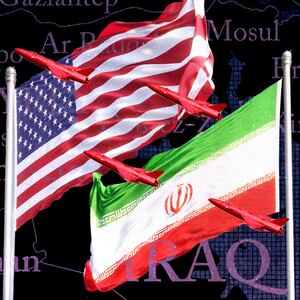Despite the Biden administration’s best efforts to try to prevent the Israel-Hamas war from spilling over across the region, Iran-backed Houthi rebels are firing off one attack after another in the Red Sea, forcing U.S. military assets to deflect them or face possible broader escalation, U.S. officials say.
Houthi rebels launched drone attacks against three civilian vessels on Sunday, prompting the USS Carney to respond. On Wednesday, the USS Mason shot down another attack.
“We're going to do what's necessary to protect our forces,” Pentagon Spokesperson Brig. Gen. Pat Ryder told reporters this week.
Behind the scenes, though, Saudi Arabia has been lobbying the White House to not escalate things, according to a new report from Reuters.
The Biden administration may be hesitant to respond further to the Houthi attacks for fear of upsetting the current status quo of affairs in Yemen, which saw a truce between the rebels backed by Iran and a Saudi-led coalition end last year. The truce has mostly held although it ended last year.
Bruce Riedel, a former CIA analyst and a senior advisor on South Asia and the Middle East to four presidents, told The Daily Beast in an interview that Saudi Arabia is interested in keeping tensions simmered in Yemen to save face on the world stage.

Sailors assigned to the guided-missile destroyer USS Carney stand watch in the ship’s Combat Information Center during an operation to defeat a combination of Houthi missiles and unmanned aerial vehicles.
Mass Communication Specialist 2nd Class Aaron Lau/U.S. Navy“The Saudis don’t want to burn any bridges anymore. That’s why they resumed ties with Iran. That’s why they have looked to end the war in Yemen,” he told The Daily Beast. “They saw themselves three years ago in a very perilous situation. They were bogged down in a very expensive war in Yemen, which they had no hopes of winning and which was creating the image of a Saudi bully.”
The Biden administration is likely to be receptive to these overtures from Saudi Arabia, said Riedel.
“The ceasefire in Yemen is to a certain degree a Joe Biden success story. His foreign policy in general does not have a whole lot of success stories,” Riedel said.
Deliberations about how to handle the Houthis come as the United States works to curb the Israel-Hamas war from spiraling across borders. In addition to Israel and Hamas exchanging fire, Israeli forces have been skirmishing with Iran-backed Hezbollah in Lebanon, raising the prospect that Iran’s financing and support to Hezbollah sparks a greater standoff. And with tensions high as Houthi attacks continue to rain down on the Red Sea, the region threatens to explode into even further chaos with a single misstep.
The current operational thinking on the Houthis could represent a departure from how the Biden administration has responded to Iran-backed attacks on U.S. military targets in Iraq and Syria in recent weeks. To those, the United States has responded in kind with retaliatory strikes.
Pentagon officials have stated that the U.S. military had to defend itself against Houthi attacks in recent days, which is why the military responded. But officials have been careful in claiming they’re not sure Houthis were trying to deliberately attack the United States.
“They were within the threat ring and the commanders took the appropriate action to ensure that they were defending themselves,” Ryder told reporters Tuesday of the weekend attacks.
Houthi military spokesman Brig. Gen. Yahya Saree has said that the attacks are intended to prevent Israel from operating in the Red Sea as a way to coax it into halting attacks on Gaza.
The United States ought to be responding with more force in order to take out their capability before someone gets killed, Michael Mulroy, the former Deputy Assistant Secretary of Defense for the Middle East, told The Daily Beast.
“The Pentagon needs to use its ability to respond... In other words, if they launch a cruise missile or a drone supplied by Iran at a U.S. vessel and we know it's targeting us, they should be able to—just basic self defense—respond to the point of origin,” Mulroy said.

The guided-missile destroyer USS Carney defeats a combination of Houthi missiles and unmanned aerial vehicles in the Red Sea.
Mass Communication Specialist 2nd Class Aaron Lau/U.S. NavyGameplan
Other response options could include going after storage facilities for the weapons.
“If one of these drones or cruise missiles gets through, how are we going to explain it if we lose some sailors or marines?”
Gen. Frank McKenzie, the former head of U.S. Central Command, said the Biden administration needs to respond more forcefully before we get to that point.
“Sometimes you’ve got to throw a pitch,” McKenzie said in a Politico interview. “You can’t catch eternally, because eventually the law of averages is going to turn against you, and you’re going to take a significant escalatory event on a ship, and then you’re going to be forced into an even more significant level of response.”
The Pentagon is stressing that the United States is not interested in expanding the conflict to involve the Houthis.
“We’re not in an armed conflict with the Houthis,” Deputy Pentagon Spokesperson Sabrina Singh told reporters Thursday.
U.S. targets or not, it’s possible that escalation takes place in the Red Sea if the Houthis hit a U.S. vessel and the Biden administration feels compelled to act. In that case, it’s also possible that the Houthis take action in Yemen, reigniting tensions there.
“If we did a retaliatory shot at some Houthi headquarters, I would be surprised if the Houthi’s response was to fire a missile into Riyadh,” Riedel said.
The Biden administration has been working to establish a maritime taskforce to handle the ongoing turbulence in the region as a solution instead, the Pentagon has said.
Biden sent his Special Envoy for Yemen, Tim Lenderking, in recent days to conduct both diplomacy to create a lasting ceasefire to the Yemen conflict, as well as “intensive” diplomacy regarding maritime security in the region as Houthi attacks continue, according to the State Department.







